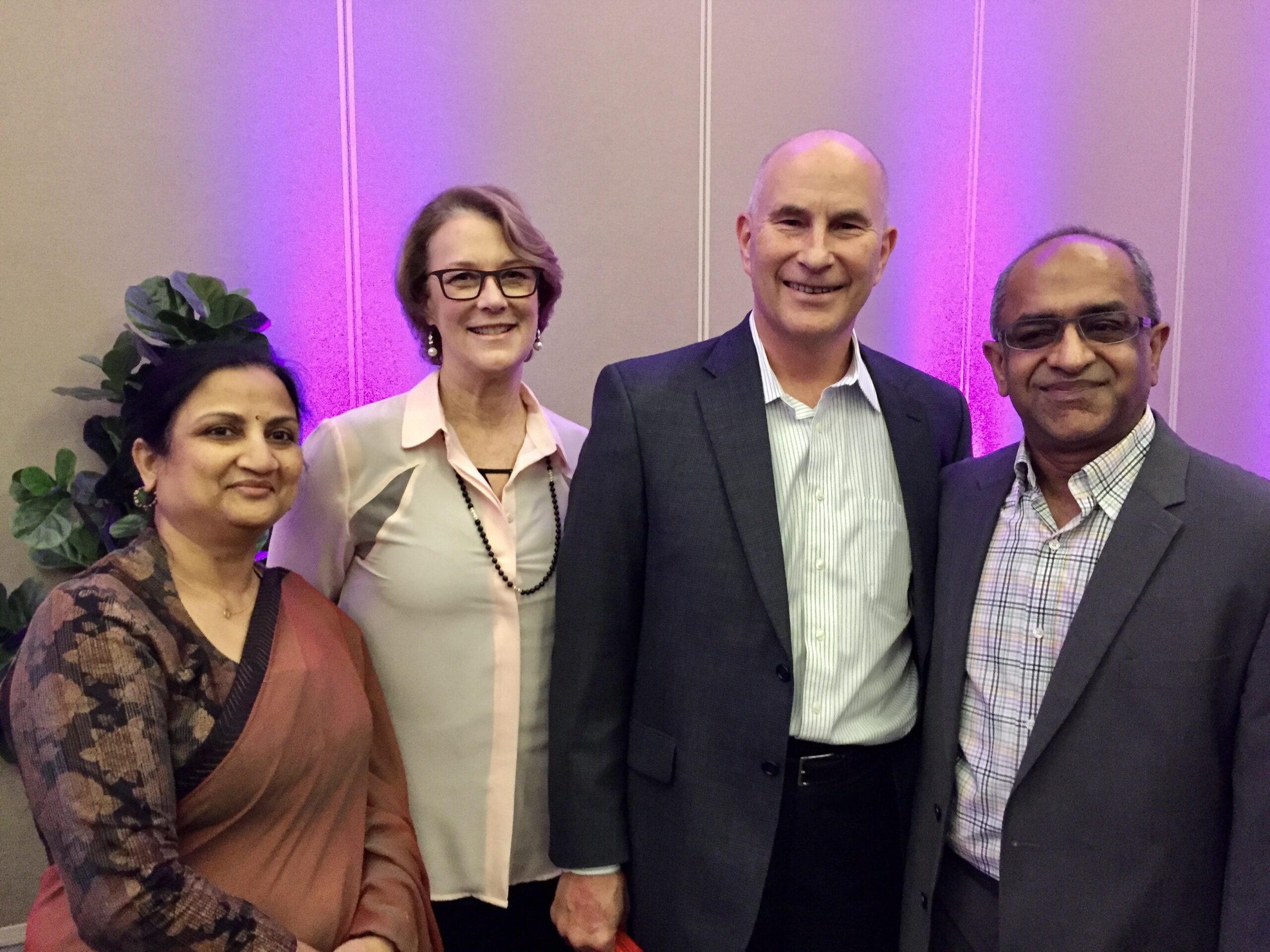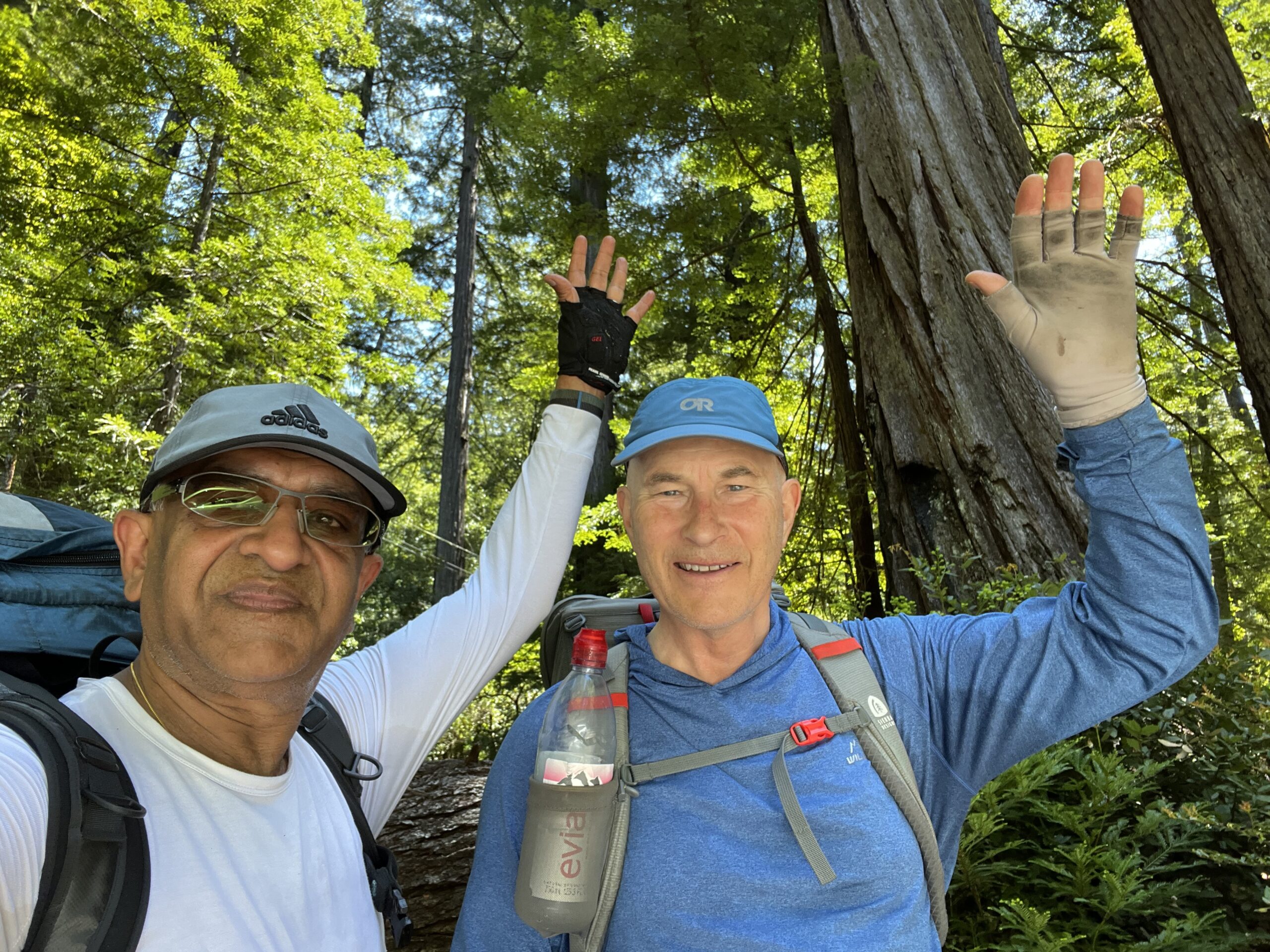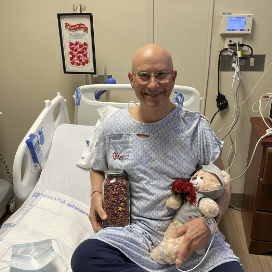The Power and Joy of Giving

The Bhargavas and Byrons celebrated the completion of their DCI year in December of 2015. At the time, they had no idea of how their friendship would deepen in the future.
After completing the DCI program in 2015, the Inaugural Class established a book club in order to continue the community they created while at Stanford. Over the past seven years, the club continues to meet; even the pandemic didn’t stop them from gathering – virtually of course. The club has given the Class of 2015 the opportunity for continued bonding over intriguing books, delicious food and continued sharing of their own lives.
In this account, DCI 2015 Fellows Jeff & Debbie Byron and Raj & Rashmi Bhargava share how they have bonded at the highest level – the gift of life.
At their cohort book club meeting three years ago, Raj Bhargava (DCI 2015) and Rashmi Bhargava (DCI 2015) announced that Rashmi was in renal failure and would soon need a kidney. At the time Raj and other members of the Bhargava family were not considered acceptable donors. This prompted Jeff Byron (DCI 2015) to consider becoming an organ donor. He thought about it for several days and decided that he could donate. He was in good health and Rashmi’s family needed her love for many more years to come!
Even though Rashmi was diagnosed with kidney disease 20 years ago, she recalls, “I was shocked three years ago when I was told that I would soon need a kidney transplant, and that neither Raj or my other family members would qualify to be donors. During this timeframe the reality of low kidney function was hitting me along with the inevitable reality of the potential need of kidney dialysis and an eventual transplant. It felt surreal that Jeff was willing to donate his kidney for me, yet at the same time I was not surprised by his generosity.”
Raj was both surprised and inspired by Jeff’s incredible gesture to donate his kidney for Rashmi. It was the beginning of a wonderful journey together. This motivated Raj to immediately take the necessary steps to improve his own health in order to qualify as a donor.
Debbie Byron (DCI 2015) was not surprised at her husband’s choice. “Jeff’s decision to donate a kidney is entirely consistent with who he is – taking action, solving problems, reflecting his values, caring for those in need. In addition to the incredible generosity and life-giving altruism of the organ donation, Jeff’s commitment to our DCI friends has a lifelong impact for us both, as Raj and Rashmi have become family to us. It’s been a learning journey for all four of us, including me, as I watched with wonder as they each faced surgeries and recoveries, and built a solid support network across families. We are now vested in their family’s well-being, and our shared purpose to shed more light on the potential of living donations.”
Jeff and Raj went through the donor screening process knowing that if they both qualified this could double Rashmi’s chances of receiving a live kidney. They lost weight, improved their commitment to a healthy diet and exercise, and came to fully understand the risks and benefits of donating. This gave them the confidence that they would make a full recovery after the donation.
Once Jeff qualified, he and Raj started a friendly competition to see who would be matched to a donor first. Rashmi did very well in maintaining her own good health thus delaying her immediate need to go onto dialysis (not desired during the COVID-19 pandemic). Because of their new bond, Rashmi adopted Jeff as her “brother.” Now she was more optimistic about her future.
In mid-August 2022, Raj “won” the competition. The National Kidney Registry (NKR) matched Raj with a recipient who had a loved one willing to donate a kidney that was a genetic match for Rashmi. This was great news for Rashmi. She and Raj prepared for kidney donation and transplant surgery that would occur on the same day – August 31, 2022.
The Stanford Kidney Transplant Team refers to this as a “swap” of live kidneys, which is highly preferred instead of waiting for an interminable period for a kidney from a deceased donor. Most people in renal failure only have this option and often wait for years. Tragically the phone call with a match often never comes. For Rashmi, the wait for a deceased donor might have been 10 years.
August 31st was a magical day. Raj and Rashmi’s swap went perfectly – in great part due to the incredibly talented and dedicated doctors and staff at Stanford Hospital. Raj remembers that day well. Immediately he felt an immeasurable satisfaction of giving life. On the same day Rashmi became a live kidney recipient – eternally grateful with her new lease on life.
Rashmi was extremely thankful to Raj and Jeff for improving their own health in order to qualify as donors. “I wish there were more caring and healthy people in this world willing to be organ donors while they are living. Nothing is more valuable than this gift,” remarks Rashmi.

Raj and Jeff enjoy hiking together on local trails.
She recalls, “as all the events unfolded, I felt some super power was taking care of me.” After the kidney transplant, Rashmi felt tremendous gratitude towards her family, Jeff, all the doctors and the entire Stanford healthcare team. She feels incredibly fortunate that her new kidney is functioning well, providing a new opportunity for a healthy life.
As caregivers, Jeff and Debbie had front row seats to Rashmi and Raj’s recovery. They shared in their joy, and most of all, felt Raj and Rashmi’s love for each other. Jeff and Debbie still get teary-eyed reflecting upon what they went through, and what Rashmi was able to avoid, because of the priceless gift that Raj gave to her.
Raj healed quickly; he was given a complete medical release at his six-week checkup, and returned to his normal lifestyle. Following her surgery, Rashmi improved immediately and has made a steady recovery. Within a few months it was clear that neither of them would need Jeff’s kidney.
However, Jeff still wanted to be in the game – to experience that same power of giving that Raj had experienced. The Stanford Kidney Transplant Team team was more than ready to accommodate the wishes of another informed and qualified donor. As an undesignated donor Jeff was able to include his immediate family members on a voucher list that would give them priority for a live kidney if, by rare chance, one of them needed a kidney in the future.
On Valentine’s Day 2023, a woman in Portland, whom Jeff may never know, received a new beginning with the kidney Jeff donated. It was an amazing feeling! When he awoke in the recovery room, Jeff felt euphoric with the joy of giving. He went home the next day to begin his recovery process, slept in his own bed, and received wonderful care and attention from his wife, Debbie. Raj and Rashmi looked after Jeff too – providing comfort and understanding. Their bonds were strengthened through these common experiences in a way that is not easily described.

With a little help from his friends,
Jeff recovered quickly from his surgery.
Sharing this journey with Raj and Rashmi, and with the constant support and encouragement from Debbie, left a profound impact on Jeff. “I feel very fortunate to have been able to offer the gift of life to another person, while simultaneously finding deeper meaning in my own life”.
Upon reflection, the two couples note how this experience unexpectedly combined DCI’s pillars of Purpose, Community, and Wellness in a very meaningful and significant way. With their newly acquired deep personal understanding of how to assist those needing kidney transplants, they have embarked together on a goal, with the Stanford Kidney Transplant Team and others, to increase the number of living kidney donors.
By Jeff Byron
with remarks by Raj & Rashmi Bhargava, and Debbie Byron
Some Facts and Resources About Kidney Transplants in the U.S.
The vast majority (83%) of those awaiting transplant surgery in the US are for kidneys. In addition, there are another 20,000 people awaiting transplant surgery for liver, heart, pancreas, lungs, and even hands, faces, and abdominal walls.
Chronic Kidney Disease (CKD) affects about 1 in 7 adults; approximately 786,000 people are living with End Stage Kidney Disease (ESKD). The median wait time for a kidney transplant is over 4 years. In 2020, a total of only 22,817 kidney transplants were completed.
As of 2021, 169 million people in the US have generously registered to be donors upon their deaths. This is indicated on their driver’s license with a pink “donor” dot if they have opted-in to this registry. However, not everyone who registers this way is able to donate as only 3 in 1,000 people die in a way that allows for deceased organ bestowment.
There were more than 14,900 deceased donors in the US in 2022. This is a 39% increase over the past five years and the 12th consecutive record-breaking year! However, there are more than 58,000 people actively waiting for an organ and nearly an additional 50,000 whose surgeries are delayed due to COVID or other medical issues.
More than 98% of transplanted kidneys from living donors through the National Kidney Registry (NKR) are still working one year after transplant. Paired Exchanges and Standard Voucher programs through NKR allow for flexibility and better outcomes for recipients. Patient More than 98% of transplanted kidneys from living donors through the National Kidney Registry (NKR) are still working one year after transplant. Paired Exchanges and Standard Voucher programs through NKR allow for flexibility and better outcomes for recipients. Patient mortality rates of kidney transplant recipients from living donors is astoundingly low due to better matching and recent medical advances.
The Donor Shield Program assists and protects the health of live kidney donors. In the unlikely event that a NKR donor ever needs a kidney transplant, the living donor assistance offered by Donor Shield includes prioritization for a living donor kidney transplant. To date, the NKR has facilitated more than 6,000 transplants and none of these donors have returned in need of a kidney transplant.
There are two types of Voucher Programs available to NKR kidney donors. The Standard Voucher Program, the donor sets his donation schedule and provides a voucher to someone who is in imminent need of a kidney transplant. When the voucher holder is ready for transplant surgery, they can activate the voucher to be prioritized for a living donor kidney. Donors using the Family Voucher Program, can also donate according to their schedule while providing up to five vouchers for family members who are not in imminent need of a transplant.
The process of becoming a living kidney donor is thorough, very low risk, and results in tremendous benefits for both the recipient and donor. The ideal kidney donor is healthy and of an age to have established their health profile – younger donors are eligible, but their lifestyles and future health needs may not be as well-established as somewhat older donors.
